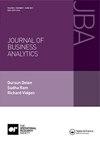优化应急气体泄漏管理:业务分析中的案例研究
IF 1.7
Q3 COMPUTER SCIENCE, INFORMATION SYSTEMS
引用次数: 0
摘要
管理对报告的气体泄漏的响应对公用事业和监管机构都非常重要。本文利用商业分析方法来研究管理气体泄漏响应的策略,同时平衡公用事业和监管机构的目标。该方法将业务问题的翻译集成到一个定量框架中,通过该框架可以对实际气体泄漏数据进行分析和建模,以衡量不同气体泄漏响应策略的性能。利用基于agent的仿真模型提供决策支持平台,将分析结果转化为可视化工具,以帮助利益相关者和决策者评估不同应对策略的影响。本文强调了在业务分析上下文中必须管理的分析方法和相关的“软技能”,以确保所有涉众都能接受的结果。本文章由计算机程序翻译,如有差异,请以英文原文为准。
Optimizing management of emergency gas leaks: a case study in business analytics
ABSTRACT Managing the response to reported gas leaks is of significant importance to both utilities and regulators. This paper utilizes a business analytics approach to investigate strategies for managing gas leak response while balancing the objectives of both utilities and regulators. The approach integrates the translation of the business issue into a quantitative framework by which actual gas leak data can be analysed and modelled to measure the performance of different gas leak response strategies. An agent-based simulation model is utilized to provide a decision support platform that translates the analytic results into a visualization tool to assist stakeholders and decision makers in evaluating the impact of different response strategies. The paper highlights both the analytic methods and the related “soft skills” that must be managed in the business analytics context to ensure an outcome that is acceptable for all stakeholders.
求助全文
通过发布文献求助,成功后即可免费获取论文全文。
去求助
来源期刊

Journal of Business Analytics
Business, Management and Accounting-Management Information Systems
CiteScore
2.50
自引率
0.00%
发文量
13
 求助内容:
求助内容: 应助结果提醒方式:
应助结果提醒方式:


